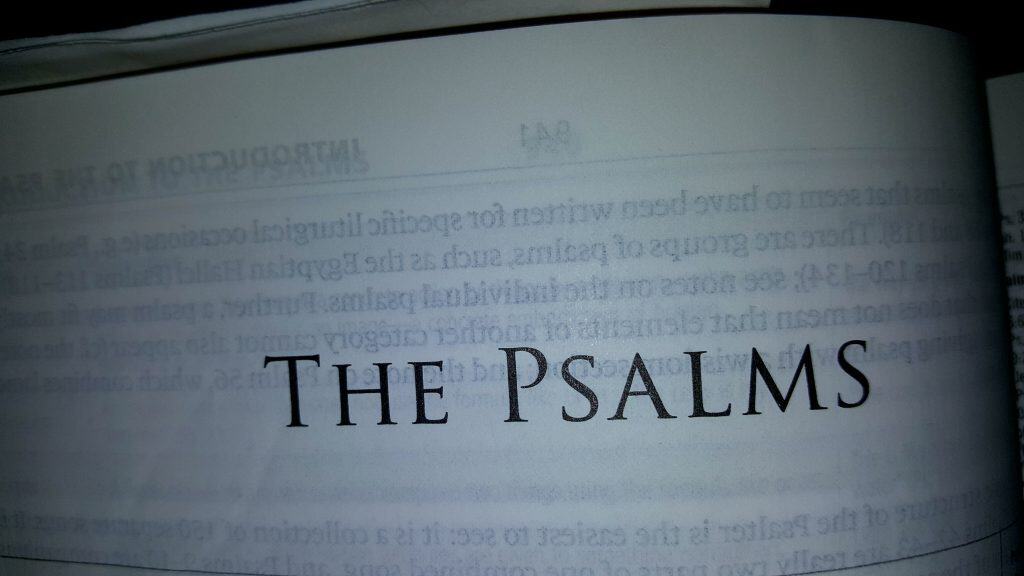⏱️ Estimated Reading Time: 9 min read
Psalm 119:1-8, “Blessed are those whose way is blameless, who walk in the law of the Lord! Blessed are those who keep his testimonies, who seek him with their whole heart, who also do no wrong, but walk in his ways! You have commanded your precepts to be kept diligently. Oh that my ways may be steadfast in keeping your statutes! Then I shall not be put to shame, having my eyes fixed on all your commandments. I will praise you with an upright heart, when I learn your righteous rules. I will keep your statutes; do not utterly forsake me!”
Psalm 119 is at once an inspiring work of art and a penetrating exploration of the interplay between the law of the Lord, the promises of the Lord, and the reality of suffering. On the one hand, the Psalm is a complex acrostic poem that’s organized according to the letters of the Hebrew alphabet. Each of the twenty-two stanzas is made up of eight lines with each line of each stanza beginning with the same letter of the Hebrew alphabet. So the first stanza is Psalm 119:1-8. Each of its verses begins with the Hebrew letter aleph. The Psalm continues in this way to the end of the Hebrew alphabet, leaving us with one-hundred-seventy-six glorious verses on which to meditate and by which to grow in our understanding of God and how He works with His people.
On the other hand, while the artistry of Psalm 119 amazes and inspires, the structure does not stand in the way of the substance. Indeed, so great was the grace of God upon the Psalmist, that he found a way for the structure to serve the substance. Psalm 119 is truth wrapped in beauty. It is penetrating insight presented in the form of art. It is an invitation to be taught by God and to be amazed by God at the same time.
So as you give yourself to meditating on this Psalm over the next several weeks to months, I encourage you to notice its artistry and ponder its substance. Ask yourself the following questions: What is the point of Psalm 119? Why did God present this point in this way? What has this to do with my life in Christ?
With that said, let’s now dive into the first stanza and delight our souls in the delightful words of God.
The Promise (Psalm 119:1-3)
Blessed—the first word of Psalm 119—means “happy or fulfilled or satisfied.” God has hardwired human beings to desire joy, and we will seek it all the days of our lives. Even those who are sunk in depression long for days of joy. Also, those who are addicted find no more joy in their chosen obsession deeply long for days of joy. In His grace, the Lord had made us to be happy and therefore inspired the Psalmist to teach us the path to happiness.
So, do you want to be genuinely and eternally happy? Then live the “blameless” life, that is, walk in the law of the Lord. This is less about perfection and more about direction. Listen to the words of the Lord each day. Value them. Meditate upon them. Apply them to your life by the power of His might, and watch what happens to your soul over time. You may not notice a drastic change on day one or two or ten, but the effect of putting God and his Word above all things, day after day, is that you will find yourself satisfied in God. Indeed, those who keep the testimonies of the Lord and seek Him with all that’s in them are those who consistently walk in God’s will and way. It is they (God’s people) who are happy and daily satisfied by the grace of God.
The Command (Psalm 119:4)
Since the Lord designed us for happiness and so longs us to be happy in Him, He has commanded his “precepts to be kept diligently” (Psalm 119:4). The word here for “diligently” means “muchly,” or as the ancient Greek version of the Old Testament reads, “exceedingly.” In other words, the Lord has commanded that His precepts have first place in our lives and a consuming influence on our hearts. And since clinging to and living by His precepts is the path to happiness, this is an exceedingly benevolent command.
Beloved of God, we really need to meditate on this. The Lord has created us to be happy—truly, genuinely, eternally happy. He is so for our happiness in Him; He has shown us the path to happiness rooted in Him. When God commands us to make much of his words, he’s not saying that His words are greater than Himself. Rather, he’s saying that His words reveal his person, since, they are a manifestation of his glory, wisdom, and grace. Therefore, to love and live by the words of God is to love and prefer God above all things, and this is the path to happiness.
The Application (Psalm 119:5-8)
With this in mind, the Psalmist cries out with all of his heart, “Oh that my ways may be steadfast in keeping your statutes” (Psalm 119:8). He knows the path to lasting joy, for the Lord has made it clear. Accordingly, he pleads with his own soul to be faithful to God in the measure that God has been faithful to him since he longs to value the statutes of the Lord, which have become so valuable to him.
The Psalmist knows that if he succeeds in honoring God and his words, he will not be ashamed in the sight of God or people, for his eyes and his heart will be firmly fixed on all the gracious commands of the Lord. Although the path may not be easy, the end of this path is certain because the Lord does everything He says He will do and fulfills every promise He makes. Therefore, for the Psalmist to value God’s commands above all things was to guarantee his eventual and eternal happiness because God is faithful and all-satisfying. This is why the Psalmist proclaims in verse 7, “I will praise you with an upright heart when I learn your righteous rules.” It’s not that he will simply honor the Lord or thank the Lord or surrender his life to the Lord, it’s that he will do these things in a particular way. Namely, he will inwardly rejoice in the Lord and outwardly give praise to the Lord. Indeed, the happiness given by the Lord always produces authentic praise, for the heart that is happy in God simply must complete its joy by praising the source of its joy, God.
The Psalmist then concludes the first stanza by committing his soul to this way: “I will keep your statutes,” however, he also adds, “do not utterly forsake me” (Psalm 119:8). This is the first indication we have that something is not quite right in the life of the Psalmist. He has seen the path to happiness and the graciousness of God in commanding him to walk in it. As a result, He has committed himself to cling to the ways of the Lord no matter the cost or consequence. He’s also concerned that somewhere along the way, the Lord will leave him. He has a fear of being forsaken because his faith is not fully developed. He’s likely from my perspective in the midst of a time of testing that’s exposing his insecurities and unbelief in the faithfulness and goodness of God. He has also heard the words of God but wonders if the Lord God will now be faithful to his words? This is the question that is gripping the Psalmist’s soul.
Friends, please keep this in mind and pay close attention to how the Psalmist draws this out, for Psalm 119 is about the interplay between the law of the Lord, the promises of the Lord, and the reality of suffering.
The Gospel and the Path to Happiness
One more word before I close out this article. Psalm 119 makes the path to happiness abundantly clear and simple—walk in the ways of the Lord, and you will know the satisfying joy of the Lord. But as clear and simple as this is, it’s also impossible because our hearts are exceedingly sinful and prone to wander away from the Lord at every turn.
Friends, we fail in thought, feeling, speech, and action more than we can imagine, and the consequences of our wanderings are more serious than we can understand. But praise be to God, Jesus perfectly honored the words of God the Father and perfectly kept every single one of them. As Jesus said near the end of his earthly ministry in John 12:49-50, “For I have not spoken on my own authority, but the Father who sent me has himself given me a commandment—what to say and what to speak. And I know that his commandment is eternal life. What I say, therefore, I say as the Father has told me.”
And not only did Jesus fulfill the call of Psalm 119 by honoring every word of His Father, but He also laid down His life for those who rebelled against His Father by brushing aside His words. Since this is so, whoever puts their faith in Jesus will find that all their sins have been forgiven. Or as John put, “whoever believes in him [will] not perish but have eternal life” (John 3:16). In other words, whoever believes in Jesus will be forever satisfied in and with God.
So now let me ask you, do you want to be happy—truly, genuinely, and eternally happy? Then put your faith in Christ and daily cling to the One in Jesus who perfectly fulfilled the righteousness commands of Psalm 119 on behalf of His Beloved.




